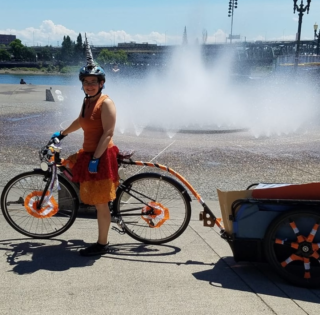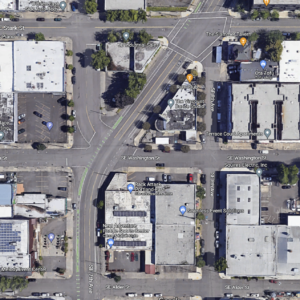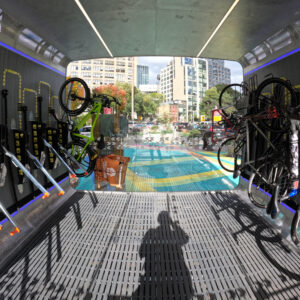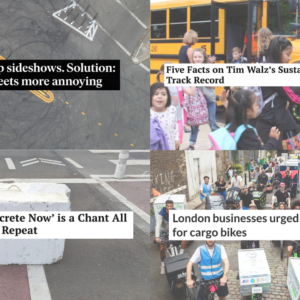
[NOTE: This is a guest post from a BikePortland subscriber.]
As Joe Biden mentioned during his speech at the DNC convention last month, we face four historic crises: a pandemic, a collapsed economy, a struggle for racial justice and a threat of climate disaster. While the first three of these are front of mind for most of us, it is the last one that really keeps me up at night. Maybe that’s true for you as well? I suspect that climate change is never far from the bike community’s mind. Fortunately, there’s a straightforward way to start bringing down carbon emissions quickly and addressing the climate crisis: put a price on carbon.
Like many people in the biking community, I ride for many reasons, including convenience, health, community and fun. I started bike commuting more than 20 years ago because it was an easy, quick way to get to work. Then I started going on group weekend rides for camaraderie and exercise. To encourage others to rediscover the joy of biking, I was the Bike More Challenge co-captain at my workplace for over a decade. It was satisfying to help others get back into biking. I also led a Climate, Cycle and Creamsicles ride for Pedalpalooza.
Another big motivator for me to bike is climate change; my guess is this is true for many cyclists. Biking is an easy and fun way to reduce my personal carbon footprint. Unfortunately, changes in personal behavior and thoughtful individual choices are not enough to reverse climate change. This was driven home when I attended a climate workshop about a decade ago: in order to reduce carbon emissions in time to avoid irreversible catastrophic damage, we need national solutions.
After the 2016 elections, I decided to channel my angst and anger into working towards a climate change solution. Ultimately I joined Citizens’ Climate Lobby, in part because they work at the national level. I also found the community inspired me and the core values resonated with my own.
CCL advocates for a policy called Carbon Fee and Dividend which will achieve aggressive reduction in our use of fossil fuels, the largest source of greenhouse gases. This policy is now an active bill in the US House of Representatives called the Energy Innovation and Carbon Dividend Act.
This bill would place a fee on coal, oil and gas at the point of extraction or port of entry. Each year this fee would go up significantly until we reach the goal; 90% emissions reduction. Net proceeds from the fees collected would be returned to households in the form of monthly dividend checks, helping offset expected increases in prices. Equity is a one of my core values, so I want to make sure we take care of the most vulnerable people as we transition to a green economy. Seventy-five percent of the population will come out even or ahead with these dividends. Ninety-six percent of poor households (the bottom 20 percent) will receive more than they end up paying.
The dramatic effects of a warming planet were all too present this summer, from California fires to Gulf Coast hurricanes. The only way we are going to reverse this trend is to drastically reduce carbon emissions. Economists tell us the most effective way to do this is price it, which is why more than 3,500 economists have endorsed Carbon Fee and Dividend. The Intergovernmental Panel on Climate Change (IPCC) report states that a high price on carbon is necessary to stay under 1.5 degrees of warming.
Can we get it passed? Absolutely! This bill had seven cosponsors when it was introduced last January. That number has now climbed to 82 because people like you and me have asked our Representatives to support it. This bill has by far the most cosponsors of any carbon pricing bill in US history.
Will this bill entirely solve the climate change problem? No, there is no one silver bullet. But this is the single most effective solution to start. It will reduce carbon emissions 40% in 12 years, which will also buy us more time to implement other solutions and mitigation strategies.
I admire the biking community for its passion around transportation and its efforts to make biking safer and more accessible. More bikers means fewer carbon emissions. But I also encourage this community to work for a national climate change solution by joining CCL or calling and/or writing to members of Congress to ask them to support the Energy Innovation and Carbon Dividend Act. I invite you to join our monthly Portland chapter meeting, which takes place on the second Saturday of the month via Zoom. It is an inspiring and efficiently run meeting that will leave you feeling hopeful for a healthy planet – one in which our grandchildren and their grandchildren will want to ride their bikes.







Thanks for reading.
BikePortland has served this community with independent community journalism since 2005. We rely on subscriptions from readers like you to survive. Your financial support is vital in keeping this valuable resource alive and well.
Please subscribe today to strengthen and expand our work.
Thank you Francine,
Yes, climate change is also one of the top reasons I ride.
One of the many features I like about the carbon fee is that it “unhides” the “hidden costs” that economists talk about. The “invisible hand” can’t do its thing if it is blind to the costs. (In high school and college I was interested in economics, winning a scholastic competition and getting a partial scholarship to college. Where I studied Mechanical Engineering because I wanted to design the next V8 Camaro….hopefully I’m a bit older and wiser now!)
It would also be very helpful if “we” could stop subsidizing the artificially low cost of fuel with billions of dollars of tax breaks. We can’t afford bike lanes, but can afford to give billions to the oil industry.
Thanks for taking the time to write this well thought out article,
John
Thank you for your kind and insightful comments, John. I agree – one of the elements I like about carbon pricing is that it corrects a market failure.
I too would like end fossil fuel subsidies; it is a skewed priority. If there was an organization fighting subsidies with 180,000+ members, I would consider volunteering with them. In the meantime, if we can get this bill passed, in 10 years the fee would be $105 per ton of fossil fuel – which I believe is much higher than the subsides.
Francine